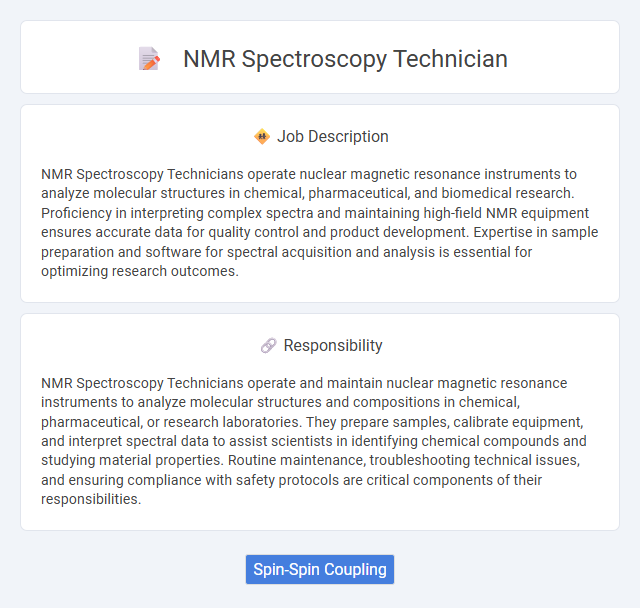
NMR Spectroscopy Technicians operate nuclear magnetic resonance instruments to analyze molecular structures in chemical, pharmaceutical, and biomedical research. Proficiency in interpreting complex spectra and maintaining high-field NMR equipment ensures accurate data for quality control and product development. Expertise in sample preparation and software for spectral acquisition and analysis is essential for optimizing research outcomes.
Individuals with strong attention to detail and a solid background in chemistry or physics are likely to be well-suited for an NMR Spectroscopy Technician role. Those who enjoy working in a laboratory setting and can handle repetitive tasks with precision may find the job rewarding. People who struggle with prolonged focus or have difficulty managing complex instrumentation might face challenges in this position.
Qualification
An NMR Spectroscopy Technician typically holds a bachelor's degree in chemistry, biochemistry, or a related field, with extensive experience in operating nuclear magnetic resonance (NMR) instruments. Proficiency in interpreting NMR spectra and familiarity with sample preparation techniques are essential for accurate analysis. Strong analytical skills, attention to detail, and knowledge of laboratory safety protocols are critical qualifications for this role.
Responsibility
NMR Spectroscopy Technicians operate and maintain nuclear magnetic resonance instruments to analyze molecular structures and compositions in chemical, pharmaceutical, or research laboratories. They prepare samples, calibrate equipment, and interpret spectral data to assist scientists in identifying chemical compounds and studying material properties. Routine maintenance, troubleshooting technical issues, and ensuring compliance with safety protocols are critical components of their responsibilities.
Benefit
Working as an NMR Spectroscopy Technician likely offers the benefit of gaining specialized skills in nuclear magnetic resonance techniques, which may improve career prospects in pharmaceuticals and materials science. Employees might experience exposure to advanced instrumentation and analytical methods, increasing their expertise in molecular structure analysis. There is also a probable opportunity for professional growth through collaboration with research and development teams.
Challenge
NMR Spectroscopy Technicians likely face significant challenges in accurately interpreting complex spectral data, as the intricacies of molecular structures can complicate analysis. The precision required for sample preparation and instrument calibration probably adds to the difficulty of maintaining consistent, reliable results. Staying updated with advancements in NMR technology and software may also present ongoing professional challenges.
Career Advancement
NMR Spectroscopy Technicians gain expertise in nuclear magnetic resonance technology, providing critical data for chemical analysis and molecular structure identification. Mastery in advanced NMR techniques and software enhances opportunities for promotion to Senior Technician or Research Scientist roles within pharmaceutical, academic, or industrial laboratories. Continuous professional development and specialization in multidimensional NMR or metabolomics significantly accelerate career advancement and leadership prospects.
Key Terms
Spin-Spin Coupling
NMR Spectroscopy Technicians specialize in analyzing spin-spin coupling to determine molecular structures and identify chemical environments in samples. Mastery of interpreting coupling constants and splitting patterns enhances the accuracy of chemical shift assignments and compound verification. Proficiency with advanced spectrometers and software for data processing is essential for precise measurement and analysis of spin-spin interactions.
 kuljobs.com
kuljobs.com